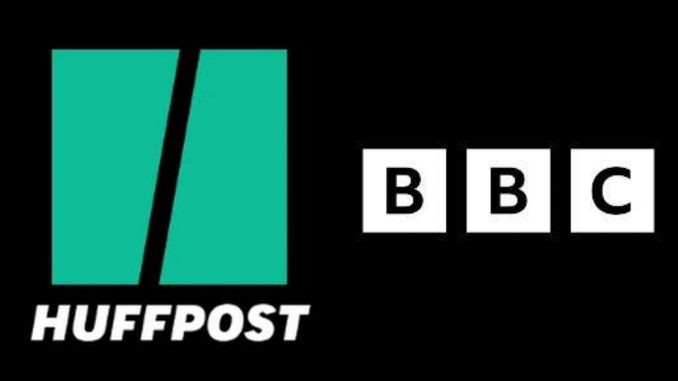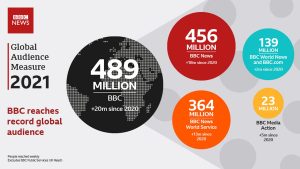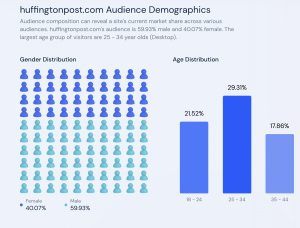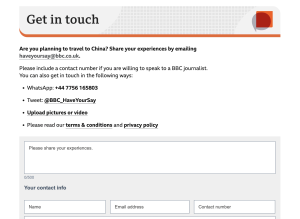
Introduction
After entering the Web 2.0 era, traditional media such as radio, paper, and TV are gradually replaced by mobile communication and social media. Same with the great popularity of short videos represented by TikTok, the online journalism industry has been reformed to meet the ultra-high-speed pace of modern life, and more and more people can become online journalists and photographers. This analysis chooses the international mainstream online news publication BBC and the digital-born commercial news service Huffington Post to compare and contrast, and explore the features of online journalism.
BBC News
BBC, the full name of British Broadcasting Corporation, is the national broadcaster of the United Kingdom. BBC was established in 1922, formerly known as The British Broadcasting Company. In 1936, BBC launches a TV service. Then, the BBC officially launched its foreign language coverage in addition to English. In the late 1990s, the BBC recognized the true potential of the Internet for public service broadcasting. As a result, the BBC has launched its official website and a digital TV channel. (History of the BBC, BBC). Today, the BBC is an international media company that combines radio, television, websites, and documentaries, and it has become the world’s largest broadcaster and mass media.
In 2020 to 2021, the BBC hit record numbers with an average of 489 million adults tuning in each week,456 million for BBC News and an increase of over 20 million on the previous year. The BBC’s audience is located in countries such as India, the United States, and the United Kingdom. (BBC Media Centre, 2021)

From: BBC Media Center
As a British state-owned enterprise, the main income of the BBC is the TV license fee from British citizens, it accounts for three-quarters of the BBC’s revenue. (Pan, 2019) In addition to this, the BBC’s other revenues come from its commercial arm, BBC Studio, and advertising. (Panjwani, 2021)
Huffington Post
The Huffington Post, also called HuffPost, is a major U.S. news site, and aggregator blog, founded in 2005 by Arianna Huffington, together with Kenneth Lerer and Jonah Peretti. On February 7, 2011, AOL announced its acquisition of The Huffington Post for $315 million. (Britannica) In November 2020, Buzzfeed acquired The Huffington Post and ended in 2021.
Freedom of the press is its hallmark. As a commercial online media featuring blogs by unpaid bloggers from politics, entertainment, and academia. On January 18, 2018, The Huffington Post announced the termination of its open blog self-publishing authoring platform, launching two closed, editorially-driven content products in its place. (Jiemian, 2018) BBC commented it was “pulling together liberal-leaning news reports, and as an alternative to conservative news aggregators such as the Drudge Report.” (Wilson, 2016)
According to Similarweb(2023), the readership of huffingtonpost.com is 59.93% male and 40.07% female, and the largest age group of visitors is 25 – 34 years old. Thirty-eight percent of the audience came from the United States, 5.9 percent came from the United Kingdom, and the remaining major countries were Russia, Germany, and Canada.

(From: Similarweb)
Unlike the BBC, the Huffington Post generates revenue through advertising. As with most free media, the main way it makes money is by selling advertising space on its website and thus earning revenue. In addition, obtaining investments is a secondary source of income. (HuttiMoney, 2022)
Summary
This summary will explore the different features of the BBC and Huffington Post’s news story on the same topic – China reopens travel visas for foreign tourists. The two news stories are China reopening borders to foreign tourists for the first time since Covid erupted by Joel Guinto from BBC News and China To Reopen Borders To Tourists After 3-Year Halt During Pandemic by Zen Soo from the HuffPost.
China reopening borders to foreign tourists for the first time since Covid erupted is published on 15, March 2023. The full article is only 271 words long but expresses several messages, including China’s reopening of tourist visas for foreign tourists, the negative impact of Covid-19 on China’s economy, and China’s new Premier Li Qiang and Xi Jinping starts his third term as Chinese President.
Writing and content production
As an online news story, it is brevity and scannability, which means it is easy to read and understand. However, it does not mean that it can be classified as a good news story. It does not include any quote or reference, although it cites a wealth of data and information that the accuracy and source credibility of story content suspected. Paul Bradshaw and Liisa Rohumaa raised that information gathering is one of the important skills of journalists. (2017, p51) Again, presenting information legally and fairly is a necessary skill for journalists. In the age of the Internet, where information is spewing out in large quantities, everyone is exposed to a large amount of information and news, either true or false, daily, and journalists must provide the audience with true and objective news. Therefore, the missing source should be added to this news story to increase the objectivity and accuracy of the news. Besides, it also missed a summary lead to give audiences a reason to read it.

Screenshot of BBC News
Online Delivery
Interaction and online delivery are two of the significant features of this news story. At the end of the article, readers are not only invited to share their experiences about traveling in China via email but also the contact information of the BBC journalist is included. In addition, readers can also share directly through the window at the bottom. Thus, enabling the audience to participate in this news story rather than just read it.
The embedded hyperlinks are another important feature of this news story. The embedded links allow viewers to jump to BBC News coverage of the story. The functions called Related Topics and More on the story at the end of the news story, make audiences can find more related stories. Also, the embedded links are used to interact with BBC news. When viewers click on the email address provided on the website, they can jump directly to Gmail, Outlook, or other email websites.
Technical Delivery
Moreover, this news story lacks multimediality and there are no more media in the article except for the feature image from Getty image. Mark Briggs(2019) argued that, by using images instead of text, journalists can improve the audience experience and increase their efficiency, image can stop time, fast way for use to absorb information, conveye the truth, and establishe mood and emotions. The lack an informative and useful image would make the article look monotonous and lacking in visual effects.
Technical Delivery
Different from BBC News, HuffPost’s China To Reopen Borders To Tourists After 3-Year Halt During Pandemic which was published on 14, March 2023 is multimediality. It uses one picture and one video to prove the current situation of Chinese society and why the Chinese government reopens borders to tourism. Such multimedia allows viewers to understand the background of the news story more visually and diversely.
Online Delivery
Additionality, HuffPost has more complete sharing capabilities than BBC News. Below the headline of BBC News, audiences can copy the link to the website. On the right side and bottom of the HuffPost website, it offers buttons for five different functions, including Email, Twitter, Facebook, bookmarkers, and conversation. Through those functions, audiences can share their comments directly and post the news story on their social platform, thus increasing the interactivity of the article.
Same with the BBC news story, this story also uses embedded links. While the difference is that, due to the unique character of the HuffPost, the link does not jump to the Huffington Post website, but to the original site of this news story, AP News. Thus, audiences cannot connect the news author directly. It also lost the connection to relate stories, this means audiences cannot find relevant news stories directly through the website.
Writing and content production
Returning to the news story itself, in stark contrast to the BBC story, this one uses multiple sources. Therefore, it increases the authenticity and objectivity of the news. The news’ lead is under 30 words, and shows the basic elements of news story’s lead, the who, what, how, when, where, and why. It follows the news story structure and proves a short background and present circumstances.
The common drawback of these two news stories is that too much of the site dominates the main visual of the site. Although HuffPost is a media with advertising as the main revenue, the interspersing of more than ten ads throughout the window not only greatly reduces the reading and visual effect of the news, but also reduces the viewer’s interest in reading it. The right amount of advertising can increase the commercial revenue of the media, but too much advertising can have a negative effect.

The ads on the HuffPost website
On balance, the BBC’s news story is more effective, it is easier to read, allowing readers to get information in the shortest possible time. HuffPost, on the other hand, allows readers to get more diverse and accurate information, and it is more attractive.
Conclusion
In conclusion, even though online journalism has reached a relatively mature stage of development, there is still tremendous room for exploration and improvement. Online journalists need to follow the basic professional and ethical code of journalism to bring simple, effective, correct, and objective news to the audience.
Reference List
Bradshaw, P. (2017). Finding leads and sources online. The Online Journalism Handbook: Skills to Survive and Thrive in the Digital Age. (2nd Edition, pp51-71). Taylor & Francis Group.
Briggs, M. (2019). Visual storytelling with photographs. Journalism Next: a practical guide to digital reporting and publishing. (4th edition, pp153-184). CQ Press.
Guinto, J. (2023, March 15). China reopening borders to foreign tourists for first time since Covid erupted. BBC News. https://www.bbc.com/news/world-asia-china-64948594
History of BBC. BBC. https://www.bbc.com/historyofthebbc/timelines/
HuttiMoney. (2022, April 25). How does Huffington post make money?. HuttiMoney. https://huutimoney.com/how-does-huffington-post-make-money/
Pan, J. (2019, December 16). “State-owned enterprise” BBC, the era of lying and earning money may be over. Jiemian News. https://www.jiemian.com/article/3784887.html
Smith, S. Week2: Features, forms & functions. The University of Sydney. https://canvas.sydney.edu.au/courses/47542/files/29695359?module_item_id=1905836
Soo, Z. (2023, March 14). China To Reopen Borders To Tourists After 3-Year Halt During Pandemic. Huffington Post. https://www.huffpost.com/entry/virus-outbreak-china_n_64103aa2e4b01ea5cd8a2780#
Wilson, B. (2016, August 11). Huffington Post founder Arianna Huffington to step down. BBC News. https://www.bbc.com/news/business-37047416
(2021, November 25). BBC on track to reach half a billion people globally ahead of its centenary in 2022. BBC Media Centre. https://www.bbc.co.uk/mediacentre/2021/bbc-reaches-record-global-audience/
(2021, May, 10). How the BBC makes money. Full Fact. https://fullfact.org/news/bbc-income/
(2022, March 23). Huffington Post (HuffPost). Media Bias/Fact Check. https://mediabiasfactcheck.com/huffington-post/
(2018. January 1). The Huffington Post announces the termination of its blogging self-media writing platform. Jiemian News. https://www.jiemian.com/article/1894746.html
(2023, February). huffingtonpost.com : Traffic Analysis and Market Share. Similarweb. https://www.similarweb.com/zh/website/huffingtonpost.com/#overview

Be the first to comment